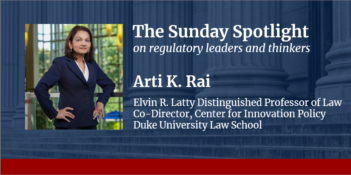
President Trump takes control of D.C. police, extends China tariff pause, eases commercial rocket rules, and more…
IN THE NEWS
- President Donald J. Trump signed an executive order placing the Metropolitan Police Department of the District of Columbia (MPDC) under federal control by declaring a state of emergency due to a claimed increase in violent crime. As authority for the takeover, the order cites the Home Rule Act, which makes D.C.’s police force available to the President for 48 hours during a state of emergency. The order delegates authority over MPDC to Attorney General Pam Bondi and provides that the President plans to retain control for the “maximum period permitted.” President Trump also mobilized the D.C. National Guard and deployed agents from the Federal Bureau of Investigation to assist MPDC officers. D.C. Mayor Muriel Bowser stated that she was not informed of the takeover and cited decreasing crime rates. MPDC’s year-to-date crime comparison shows a 26 percent decrease in violent crime as of the day the executive order was signed.
- President Trump signed an executive order extending the suspension of tariff increases on Chinese imports for 90 days, keeping rates at 30 percent as set after the May agreement that reduced tariff increases from a high of 145 percent. The extension, set to expire November 10, follows ongoing negotiations aimed at addressing trade reciprocity and national security concerns. China’s Ministry of Commerce likewise announced an extension of its tariff pause and eased some export restrictions on U.S. companies. Business groups welcomed the move as allowing time for further talks, while trade experts cautioned that major disputes over subsidies, intellectual property, and market access remain unresolved.
- President Trump signed an executive order easing regulations on commercial rocket launches and spaceport development, calling for the elimination or acceleration of environmental reviews and the exemption or rescission of certain licensing requirements. The order also seeks to assess state and local restrictions on spaceport construction and to expedite related environmental and administrative reviews, aiming to increase commercial launches and “novel space activities” by the end of the decade. Environmental advocates, including the Center for Biology Diversity, criticized the move as harmful to communities and wildlife and as weakening environmental protections.
- The U.S. Court of Appeals for the D.C. Circuit lifted a lower court order requiring the Trump Administration to resume billions of dollars in foreign aid payments. In a 2-1 decision, the panel held that grant recipients could not bring a constitutional claim over the aid cancellations because their allegations arose under statutory law. The ruling reversed a March injunction directing the U.S. Agency for International Development to release funds Congress had appropriated for fiscal year 2024. Public Citizen, a nonprofit consumer advocacy organization representing the aid recipients, criticized the decision as undermining the separation of powers and said that it will seek further review.
- The U.S. Department of Labor withdrew a direct final rule that would have eliminated a regulatory safe harbor for selecting annuity providers in individual account retirement plans. The safe harbor, created under the Pension Protection Act of 2006, sets clear fiduciary standards for choosing both providers and annuity contracts. The Labor Department initially argued the safe harbor was unnecessary after a 2019 federal law established a separate statutory safe harbor focused on insurers’ financial viability but withdrew the rule because of significant adverse comments. The Insured Retirement Institute praised the decision and warned that eliminating the safe harbor could have discouraged plan sponsors from offering lifetime income options and complicated compliance for financial professionals.
- The U.S. Food and Drug Administration granted accelerated approval of a drug that treats adults with non-squamous non-small cell lung cancer. The accelerated approval process allows earlier access to drugs for serious conditions, with continued approval contingent on confirmatory trials. The drug, called “HERNEXEOUS,” demonstrated a 75 percent objective response rate in clinical trials, with over half of patients experiencing responses lasting at least six months. Supporters, including clinical investigators and patient advocates, called the approval a significant advancement for a patient population with limited options.
- The U.S. Securities and Exchange Commission (SEC) reportedly ended its lawsuit against Ripple Labs, leaving in place a $125 million civil penalty and an injunction restricting the cryptocurreny company from certain institutional sales of the XRP token—an independent digital asset. The resolution finalizes a 2023 district court ruling that XRP token sales on public exchanges are not securities transactions but that sales to institutional investors are. XRP’s price rose between 5and 12 percent after the announcement amid speculation over potential new applications for exchange-traded funds. SEC Commissioner Hester M. Peirce defended the conclusion of the lawsuit, noting it allows the agency to focus on developing a clearer regulatory framework for digital assets.
- A group of colleges, universities, and other educational institutions were named as defendants in a class action lawsuit regarding undergraduate admissions practices filed in the U.S. District Court for the District of Massachusetts. The plaintiffs alleged that the defendants, which include the Common Application and the Consortium on Financing Higher Education, violated antitrust law by sharing applicant information and agreeing not to compete over students who apply through the early decision process. The plaintiffs also claimed that the defendants misrepresented the process as contractual, which disadvantaged price-sensitive students and helped collectively raise tuition costs.
- Texas Attorney General Ken Paxton filed a lawsuit seeking to vacate the seats held by 13 Democratic lawmakers in response to the departure of over 50 legislators from the state on August 3. After President Trump called for mid-cycle redistricting ahead of the 2026 midterm elections, the Democratic lawmakers organized to remain outside of the state to deny a legislative quorum and prevent the passage of a new congressional map that would net up to five seats for Republicans. The lawsuit follows unsuccessful measures to secure the legislators’ presence such as civil arrest warrants and $500 fines for each day of absence. Governors in California, New York, Illinois, and Florida have considered redistricting in their own states pending the outcome in Texas.
WHAT WE’RE READING THIS WEEK
- A recent U.S. Government Accountability Office (GAO) report examined the benefits, risks, and oversight of property technology tools used in rental housing. The report found that digital tools—such as tenant screening algorithms, rent-setting platforms, and facial recognition systems—can improve efficiency but also raise concerns about transparency, discrimination, and privacy. Federal agencies have addressed these risks by issuing guidance, pursuing enforcement actions, and reaching settlements, but GAO recommended more detailed direction from the Department of Housing and Urban Development on facial recognition use in public housing to better safeguard tenant privacy.
- In a recent Brookings Institution essay, Mark MacCarthy, a nonresident senior fellow at Brookings, argued that policymakers should combine the traditional negligence product liability standard with a “reasonable human driver” standard to govern liability for self-driving car accidents. MacCarthy explained that product liability law alone leaves significant gaps, including cases where victims cannot prove a design or manufacturing defect, while a “reasonable human driver” standard would allow plaintiffs to recover if they show that a competent human driver could have avoided the accident. MacCarthy contrasted this approach with strict liability and a “reasonable computer driver” standard, noting that the former could impose excessive costs on manufacturers and the latter could create uncertainty and litigation burdens. MacCarthy advised that, although this combined standard could help maintain current road safety levels, achieving higher safety goals will likely require additional regulatory performance requirements for autonomous vehicles.
- In a recent Brookings Institution essay, Michael Feuer, nonresident senior fellow in the Center for Universal Education, warned that reductions in grant funding threaten the beneficial partnership between federal research agencies, the recipient universities that advance scientific understanding, and the private sector that applies the findings. Feuer compared the first Trump Administration’s support for the “public-private” partnership that helped develop the COVID-19 vaccine to the proposed $18 billion research cuts to the National Institutes of Health for 2026, concluding that these cuts are a “potentially irreversible setback” to American science that is “largely self-inflicted.” Feuer also dispelled common critiques of universities used to advocate decreased research funding and argued that major advances in basic science originate from the public sector, where federal grants insulate science from commercial interests.
EDITOR’S CHOICE
- In an essay in The Regulatory Review, Thibault Schrepel, an associate professor of law at VU Amsterdam University and a faculty affiliate at Stanford University’s CodeX Center, argued that fostering innovation in data processing techniques may promote competition more effectively than mandating data sharing. Schrepel reviewed the European Union’s history of data sharing remedies in antitrust cases and assessed legislation such as the European Data Governance Act and the Data Act. Schrepel contended that novel approaches—such as “less than one-shot” algorithm and data distillation—could help smaller firms compete with larger ones and urged regulators to prioritize investments in these methods.



